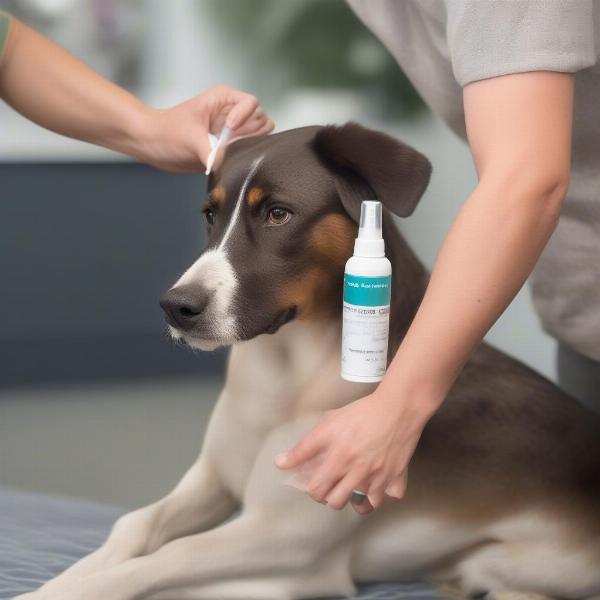Itching in dogs is a common problem that can be caused by a variety of factors, from allergies and parasites to dry skin and infections. Finding an effective anti-itch dog spray can provide much-needed relief for your furry friend and improve their quality of life. This article will explore the causes of itching in dogs, how to choose the right anti-itch spray, and other helpful tips for managing your dog’s discomfort. We’ll delve into the different types of sprays available, ingredients to look for, and potential side effects to be aware of.
 Applying Anti-Itch Spray to a Dog
Applying Anti-Itch Spray to a Dog
Understanding the Itch: Common Causes of Canine Pruritus
Before choosing an anti-itch dog spray, it’s crucial to understand the underlying cause of your dog’s itching. Common culprits include flea allergies, environmental allergies (pollen, dust mites, mold), food allergies, dry skin, bacterial or fungal infections, and certain medical conditions. If your dog’s itching is severe, persistent, or accompanied by other symptoms like hair loss, redness, or open sores, consult your veterinarian for a proper diagnosis and treatment plan. A vet can help determine the root cause of the itch and recommend the most appropriate anti-itch dog spray or other treatment options.
Choosing the Right Anti-Itch Dog Spray: A Comprehensive Guide
The market offers a wide array of anti-itch dog sprays, each formulated with different ingredients and designed to address specific issues. Some sprays contain antihistamines to alleviate allergic reactions, while others incorporate soothing ingredients like oatmeal or aloe vera to moisturize and calm irritated skin. dog anti itch spray are specifically designed to provide quick relief and target the source of the itch. For localized itching, consider a topical spray that can be applied directly to the affected area. If your dog is suffering from a bacterial or fungal infection, your vet may prescribe a medicated spray. gentacalm topical spray for dogs can be particularly effective for such conditions. Always follow your veterinarian’s instructions regarding dosage and application frequency.
Natural Remedies and Preventative Measures
Besides anti-itch sprays, several natural remedies and preventative measures can help manage your dog’s itching. Regular bathing with a hypoallergenic shampoo can remove allergens and soothe irritated skin. seborrhea dog shampoo can be beneficial for dogs with seborrhea, a skin condition that often causes itching and flaking. Adding omega-3 fatty acids to your dog’s diet can improve skin health and reduce inflammation. Maintaining a clean and allergen-free environment in your home can also minimize your dog’s exposure to potential irritants. Regularly washing your dog’s bedding and vacuuming carpets can significantly reduce allergens.
Conclusion: Providing Comfort and Relief for Your Itchy Dog
Choosing the right anti-itch dog spray can make a significant difference in your dog’s comfort and well-being. By understanding the cause of the itching, exploring the available options, and consulting with your veterinarian, you can find the most effective solution for your furry friend. Remember that regular grooming, a healthy diet, and a clean environment are also crucial for preventing and managing canine pruritus. flea sprays for dogs can also be part of a preventative strategy.
FAQ: Your Anti-Itch Dog Spray Questions Answered
- Are anti-itch sprays safe for puppies? Some anti-itch sprays are formulated for puppies, but always check the label and consult your veterinarian before using any product on a young dog.
- Can I use human anti-itch spray on my dog? No, never use human anti-itch spray on your dog. Human products can contain ingredients that are toxic to dogs.
- How often can I apply anti-itch spray to my dog? Follow the instructions on the product label or your veterinarian’s recommendations.
- What should I do if my dog licks the anti-itch spray? Most anti-itch sprays are not harmful if ingested in small amounts, but contact your veterinarian if you’re concerned.
- Can I use anti-itch spray in conjunction with other medications? Consult your veterinarian before using anti-itch spray with other medications to avoid potential interactions.
- What if the anti-itch spray doesn’t work? If the spray doesn’t provide relief within a reasonable timeframe, consult your veterinarian. The underlying cause of the itching may require a different treatment approach.
- Are there any side effects associated with anti-itch sprays? Some dogs may experience minor side effects like temporary skin irritation or drowsiness. If you notice any unusual reactions, discontinue use and consult your vet.
Related articles:
About ILM Dog:
ILM Dog is your trusted international resource for all things dog-related. From breed selection and puppy care to senior dog health and training tips, we offer expert advice and practical guidance to help you provide the best possible care for your canine companion. We cover various topics including dog breeds, health, training, nutrition, grooming, and product recommendations. Whether you’re a new dog owner or a seasoned expert, ILM Dog is your one-stop shop for reliable information and valuable resources. Contact us at [email protected] or +44 20-3965-8624 for any questions.